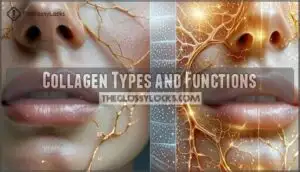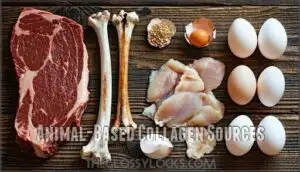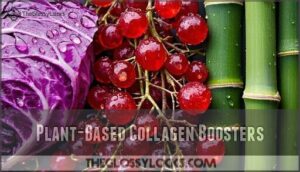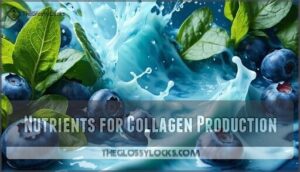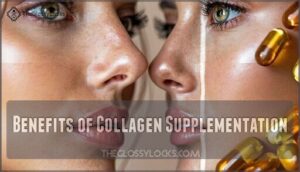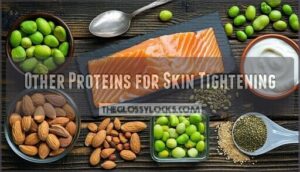This site is supported by our readers. We may earn a commission, at no cost to you, if you purchase through links.
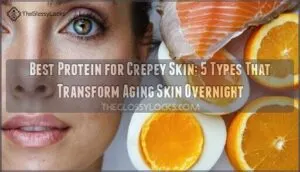
It’s like scaffolding for your skin, keeping it firm and elastic. Unfortunately, collagen naturally declines as you age, leaving skin thinner and lined.
Thankfully, collagen supplements or bone broth can help replenish those reserves. Don’t forget protein-rich foods like eggs, chicken, and fish—they’re full of amino acids your skin needs.
Pair that with Vitamin C (hello, citrus fruit) to boost collagen production. It’s not magic, but with consistency, you’ll notice smoother, healthier skin in no time. And that’s just the start of the glow-up.
Table Of Contents
- Key Takeaways
- Collagen Role in Skin
- Protein Sources for Skin Health
- Benefits of Collagen Supplementation
- Other Proteins for Skin Tightening
- Combining Protein With Lifestyle Changes
- Frequently Asked Questions (FAQs)
- Which protein tightens crepey skin?
- What is the best supplement for crepey skin?
- Which protein is best for skin tightening?
- What protein deficiency causes crepey skin?
- What protein do you need to prevent Crepey skin?
- What protein tightens saggy skin?
- What vitamin is lacking for crepey skin?
- What protein is best for aging skin?
- What is a good source of protein for Crepey skin?
- What exercises can help reduce crepey skin?
- Conclusion
Key Takeaways
- Boost collagen production with supplements or collagen-rich foods like fish, chicken, and beef to improve skin elasticity and firmness.
- Pair collagen with Vitamin C from citrus fruits and leafy greens to enhance production and repair for smoother skin.
- Stay hydrated, protect your skin from the sun, and incorporate strength training to support skin elasticity and overall skin health.
- Address collagen decline with hydrolyzed collagen peptides, which are easy to absorb and promote long-term skin tightening.
Collagen Role in Skin
In terms of keeping your skin firm and youthful, collagen is the star player that holds everything together.
Collagen is your skin’s secret scaffold, keeping it firm, smooth, and naturally youthful.
Think of it as your skin’s scaffolding—without enough of it, things start to sag and lose their bounce over time.
Collagen Types and Functions
Collagen’s structure is like a scaffold for your skin, keeping it firm and smooth.
There are over 16 types, but here are the big players:
- Type I – Found in skin, helps prevent crepey skin.
- Type II – Supports cartilage.
- Type III – Boosts organs and blood vessels.
- Types IV & V – Aid internal tissues.
Collagen research reveals its role in elasticity and repair!
Importance of Collagen for Skin Elasticity
Think of collagen as the scaffolding of your skin—without it, things get, well, droopy.
It’s the backbone of skin elasticity, helping you maintain that firm, youthful glow while warding off crepey skin.
Want proof? Check this out:
| Benefit | How It Helps | Why It Matters |
|---|---|---|
| Skin Firmness | Supports natural bounce | Reduces sagging |
| Elasticity Mechanisms | Improves stretchability | Fights crepey texture |
| Hydration Benefits | Locks in moisture | Keeps skin smooth |
Boost it with collagen protein or collagen-boosting foods for real aging prevention.
Collagen Decline With Age
As the aging process takes hold, your skin’s once-tight scaffolding weakens.
Collagen synthesis slows, elastin breakdown accelerates, and dermal thinning leads to skin fragility.
Over time, collagen loss creates crepey skin and skin thinning, robbing you of elasticity.
If your skin feels like it’s giving up, don’t worry—understanding this process is the first step to reclaiming youthful firmness.
Daily SPF use can help prevent UV damage effects.
Protein Sources for Skin Health
If you want firmer, healthier skin, focusing on the right protein sources is essential.
From collagen-rich foods to plant-based options, proteins work behind the scenes to keep your skin smooth, elastic, and glowing.
Animal-Based Collagen Sources
For crepey skin, animal-based collagen is your secret weapon.
From Beef Collagen for type I support to Fish Collagen’s skin-friendly bioavailability, each provides unique perks.
Chicken Collagen (hello, Bone Broth!) bolsters joints and skin, while Egg Collagen boosts elasticity naturally.
Antioxidant-rich foods also support collagen production.
- Beef Collagen: Skin firmness hero.
- Fish Collagen: Quick absorption.
- Chicken Collagen: A joint-skin multitasker.
- Egg Collagen: Easy dietary add-on.
Plant-Based Collagen Boosters
Vegan collagen sources are perfect for plant-based diets, offering skin-firming nutrients and antiaging protein.
Foods like bamboo extract, hyaluronic acid, and amino acid-rich soy pack a punch. Boost skin elasticity with antioxidant-rich foods like purple cabbage or red fruits.
Discover more about sourcing vegan collagen for dietary needs.
Check out this quick breakdown below:
| Vegan Ingredient | Benefits | Source |
|---|---|---|
| Bamboo Extract | Collagen Support | Plant-Based |
| Hyaluronic Acid | Skin Hydration | Fermented Veggies |
| Biotin | Hair + Nail Health | Plant Sources |
| Antioxidants | Skin Elasticity | Red Fruits/Greens |
The table provides a summary of vegan ingredients and their benefits, making it easier to understand the options available for a plant-based diet.
Nutrients for Collagen Production
In the context of collagen synthesis, your diet’s secret weapons include amino acids, Vitamin A, copper, and silica.
These skin-firming nutrients team up to boost elasticity and hydration.
Antioxidant power from collagen-boosting foods like leafy greens and citrus protects against damage.
Add these to your meals, and you’ll give your body the crepey skin protein it needs to bounce back with improved hydration and elasticity.
Benefits of Collagen Supplementation
In terms of improving crepey skin, collagen supplements give your skin the building blocks it needs to stay firm and smooth.
They’ve been shown to boost hydration, reduce wrinkles, and even make your skin look healthier—without the need for a magic wand.
Improved Skin Hydration and Elasticity
To combat crepey skin, improve skin hydration and elasticity with collagen protein.
Its amino acids support skin elasticity while boosting hydration. Regular intake can improve collagen skin elasticity.
Combine these methods with:
- Hydration Methods: Drink water regularly for internal hydration.
- Elasticity Factors: Use collagen-rich foods and supplements.
- Topical Hydrators: Apply glycerin-rich moisturizers.
- Lifestyle Choices: Manage stress and sleep well.
Your skin will thank you—literally!
Reduced Wrinkles and Fine Lines
To smooth wrinkles and fine lines, collagen protein works wonders, improving skin elasticity and firmness.
Topical retinoids boost collagen production, while treatments like laser resurfacing and chemical peels rejuvenate deeper layers.
Many turn to supplements to address collagen for wrinkles.
| Solution | Function | Benefit |
|---|---|---|
| Hyaluronic Fillers | Adds volume to lines and folds | Softer, youthful appearance |
| Facial Exercises | Strengthens underlying facial muscles | Enhances skin firmness |
| Collagen Protein | Restores skin structure and hydration | Reduces visible crepey skin |
Enhanced Skin Barrier Function
If you’re aiming for stronger skin elasticity and firmness, collagen protein doesn’t just fight wrinkles—it supports your skin barrier, too.
Think of it as your protective armor! By enhancing lipid composition, collagen boosts hydration, balances your microbiome, and shields against environmental harm.
This means better skin repair, texture, and long-lasting resilience. Ceramides and barrier care never looked brighter!
Other Proteins for Skin Tightening
You’ve probably heard collagen is great for your skin, but it’s not the only protein worth your attention.
Whey protein, omega-3s, and even vitamin C play a big role in keeping your skin firm, smooth, and youthful-looking.
Whey Protein for Anti-Aging Benefits
Whey protein doesn’t just build muscles—it’s a secret weapon against wrinkles. Packed with Whey Peptides and Growth Factors, it boosts skin elasticity and repair.
Its Antioxidant Properties support Skin Cell Turnover, keeping your glow intact.
- Promotes collagen protein for smoother skin
- Preserves muscles, enhancing firmness
- Slows aging with antiaging protein sources
- Strengthens skin elasticity protein
- Boosts protein for wrinkles
Omega-3 Fatty Acids for Skin Health
If you’re looking to boost your skin’s bounce, omega-3 fatty acids are a powerhouse.
These skin firming nutrients enhance elasticity, repair the skin barrier, and reduce inflammation.
Found in salmon, walnuts, and flaxseeds, Omega-3 benefits also include hydration improvement, leaving skin smoother and more resilient.
Think of it as a soothing balm for stressed, crepey skin!
Consistent hydration helps maintain skin elasticity, which is crucial for achieving smoother and more resilient skin.
Vitamin C for Collagen Production
Vitamin C, often called ascorbic acid, is your skin’s best ally for collagen production.
It supports skin health by jumpstarting collagen synthesis, firming aging skin.
Try these tips:
- Eat collagen-boosting foods like oranges and strawberries.
- Use topical Vitamin C serums.
- Add a supplement (500-1,000 mg daily).
- Enjoy leafy greens, rich in skin firming nutrients.
- Protect against sun damage daily to support skin health and collagen production.
Combining Protein With Lifestyle Changes
Pairing the right proteins with smart lifestyle choices can work wonders for your skin’s appearance.
When you hydrate, protect your skin from the sun, and stay active, you’re giving those proteins the perfect environment to keep your skin looking firm and youthful.
Resistance Training for Muscle Toning
Strength training isn’t just for gym buffs—it’s a ticket to firmer skin and improved body composition.
Regular toning exercises boost muscle hypertrophy, giving your skin structure and support from underneath.
Increased skin strength and resilience follow as protein synthesis strengthens tissues.
Aim for balanced workouts 2–3 times weekly to enhance skin texture and amplify the effects of skin-tightening protein.
Hydration for Skin Plumpness
Exercise tones muscles, but hydration adds the plumpness crepey skin craves. Without enough water, skin elasticity suffers.
One should also consider lifestyle and dietary factors to improve overall skin hydration.
Boost moisture levels with these hydration methods:
- Drink up: Aim for 8+ glasses daily for consistent water intake.
- Humectants benefits: Use products with glycerin or hyaluronic acid.
- Electrolyte balance: Add coconut water or sports drinks.
- Skin hydration nutrients: Eat fruits like watermelon.
- Topical hydration: Apply rich, hydrating creams nightly.
Sun Protection for Skin Aging Prevention
To slow skin aging and defend against sun damage, make sunscreen application a morning ritual.
Use broad-spectrum sunscreen for UVA defense and UVB protection. Pair it with protective clothing, like hats or lightweight sleeves, especially during peak hours.
UV radiation doesn’t take holidays, so consistent skin protection is key. Think of sunscreen as your skin’s armor—don’t leave home without it, as it provides broad-spectrum protection.
Frequently Asked Questions (FAQs)
Which protein tightens crepey skin?
Collagen is your skin’s best friend in terms of tackling crepey texture.
It boosts elasticity and firmness, acting like scaffolding for smoother skin.
Add collagen-rich foods or supplements for visible, long-term improvements—no magic required, with long-term benefits to your skin’s health.
What is the best supplement for crepey skin?
The best supplement for crepey skin is hydrolyzed collagen peptides.
They’re easy to absorb, support skin elasticity, and promote firmness.
Pair it with a healthy diet and sunscreen—it’s like giving your skin a repair crew!
Which protein is best for skin tightening?
The best protein for skin tightening is collagen, especially hydrolyzed collagen peptides.
It helps restore elasticity, smooths crepey skin, and supports firmness from within.
Think of it as scaffolding, keeping your skin structure intact!
What protein deficiency causes crepey skin?
A lack of protein, especially one rich in amino acids like glycine, proline, and hydroxyproline, can weaken collagen production.
This shortfall speeds up skin thinning, making it more prone to wrinkles and that crepey texture.
What protein do you need to prevent Crepey skin?
You’d think smooth, youthful skin would stick around, but nope—aging loves surprises.
To combat crepey skin, focus on collagen-rich proteins like fish, chicken, and beef.
They’re essential for restoring elasticity, firmness, and overall skin health.
What protein tightens saggy skin?
Boosting your skin’s elasticity starts with proteins like collagen and elastin.
These two work wonders, firming saggy skin and supporting tissue repair.
Add collagen-rich foods or supplements, and you’ll notice tighter, smoother skin over time!
What vitamin is lacking for crepey skin?
You might be low on vitamin C, which supports collagen production, keeping skin firm and elastic.
Without it, your skin’s like a deflated balloon—less bounce, more wrinkles.
Add citrus fruits, peppers, and strawberries to increase your intake of vitamin C.
What protein is best for aging skin?
Imagine your skin’s scaffolding getting a much-needed renovation—collagen is the protein superstar for aging skin.
It boosts elasticity, smooths wrinkles, and restores firmness.
Add collagen-rich foods or supplements to keep your skin plump and vibrant!
What is a good source of protein for Crepey skin?
For crepey skin, animal proteins like chicken, beef, and fish are fantastic, as they’re rich in collagen-building amino acids.
Toss in some eggs, nuts, and seeds for variety, and you’ll nourish your skin beautifully!
What exercises can help reduce crepey skin?
Focus on strength training, yoga, and Pilates to tighten muscles and improve skin elasticity.
Resistance exercises like squats, lunges, and planks boost circulation and collagen renewal—practical moves to outsmart crepey skin with grace!
Conclusion
Imagine waking up to firmer, smoother skin—it’s not just a dream with the best protein for crepey skin.
Collagen, your ultimate anti-aging ally, works alongside protein-packed foods and Vitamin C to boost elasticity and reduce wrinkles.
Pair these with hydrating habits, sun protection, and even a bit of muscle-toning exercise for noticeable results.
Sure, crepey skin won’t vanish overnight, but with daily effort, glowing, healthier skin can feel closer than ever—and you’ll love the transformation!

